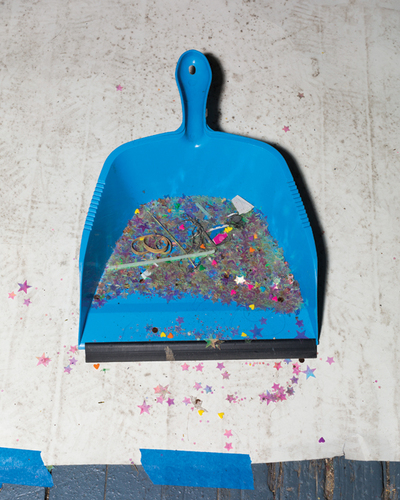Frances F. Denny: Pink Crush
Frances F. Denny, Shape of My Heart, 2015, archival pigment print, edition of five plus two artist proofs, 20 x 16″.
“Much of my work is an expression of the ways I was taught to be a woman,” says photographer Frances F. Denny. Her previous portfolio, Let Virtue Be Your Guide, tackled a girl’s formation under the reign of “WASP femininity.” Her latest series Pink Crush continues this introspective archaeology, but the staid atmosphere of Virtue has been replaced by “Lisa Frank’s rainbow color palette,” Denny says and other imagery ripped from her childhood. What emerges is a potent survey of nineties nostalgia that Denny intends as not only “saccharine, [but] maybe even revolting.” She finds neither “earnest” nor “ironic” to be accurate descriptions of the work.
Maybe the right word is “taxonomic.” Pink Crush is a visual inventory of late 20th-century girly paraphernalia, from hula-hoops and bubble gum to French braids and charm bracelets. On formal terms these photographs are impressive and tightly arranged. Strobes and colored gels are responsible for the images’ intense saturation, a chroma so high it serves as both a compositional anchor and an overdose of sensory delight. Denny contends that the photos are “not a celebration” or a sentimental enterprise, but viewers will probably find it difficult to defy the sugary charisma of these tableaus.
Some of the images are so slick they resist Denny’s efforts of subversion, such as the plastic and adorable equine of Pony Ride. Process shots, like the festive dustpan of Shape of My Heart, harbor the most deconstructive power by visualizing the ruination of these tropes. Portraits shot from behind also walk the border between cloying and creepy: Wicked Game features a young woman’s denim-overalled back encrusted in Lisa Frank stickers, their cheerful shapes suddenly resembling a bizarre and nasty rash.
A critical attitude toward nostalgia is common among photographers reared in the fluorescence of the fin de siècle. Pink Crush succeeds as a catalogue of gendered tropes, but not entirely as a horror show. Whether nostalgia is invoked intentionally or inadvertently, its weightiness toughens one’s navigating the thicket of identity politics. Pink Crush is a determined excavation of a mass-produced femininity, but it too wrestles with the seduction of days past.

